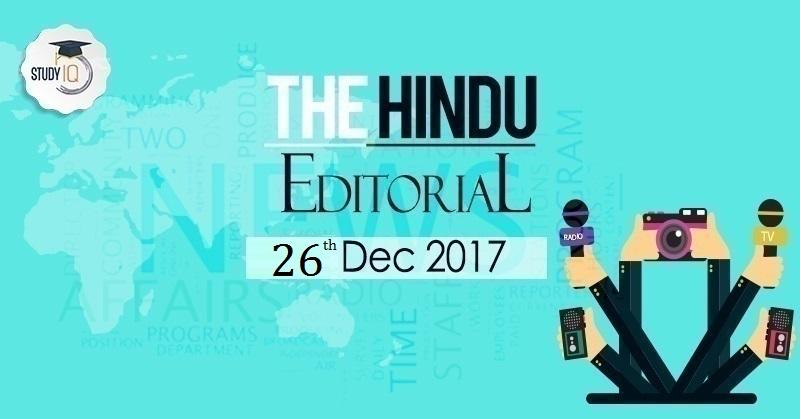Table of Contents
On the line
- It is vital that India-China talks on the boundary question pick up speed
- he meeting between the Special Representatives of India and China National Security Adviser Ajit Doval and State Councillor Yang Jiechi on boundary question on Dec 22, the 20th so far, was unique for a number of reasons.
- The talks came more than 20 months after the last round,
- Extreme strain in India-China ties, including the 70-day troop stand-off•at Doklam this year.
- Three-step process that was part of the Agreement on „Political Parameters and Guiding
- Principles for the Settlement of the India-China Boundary Question‟ in 2005 that is,
• 1)-Defining the guidelines for the settlement of border disputes,
• 2)-Formulating a framework agreement on the implementation of the guidelines, and
• 3)-Completing border demarcation - Modi-Xi agreements of 2017, including the „Astana consensus‟ that “differences
must not be allowed to become disputes” - India-China relations “are a factor of stability” in an increasingly unstable world.
- Since 2013, when the Border Defence Cooperation Agreement was signed, there has
been a steady decline in relations in all spheres
• 1)-Belt and Road Initiative with the economic corridor with Pakistan,
• 2)-Free trade agreement with the Maldives, and
• 3)- Blocking of India‟s membership bid at the Nuclear Suppliers Group. - In turn, Beijing sees
• 1)- U.S.-India defence agreements,
• 2)- Quadrilateral engagement with Japan, Australia and the U.S., and
• 3)- Indian opposition to the BRI quite the same way. - The stand-off•at Doklam was a hint of what may ensue at greater regularity unless greater
attention is paid to resolving the differences for which the SR meetings process was set up
in the •first place.
A glimmer of hope?
- Parliament with the passing of the Transgender Persons (Protection of Rights) Bill 2016?
- Dignity, respect, and access to health care are non-negotiable basic rights.
- Self-identification should be sole criterion for gender recognition legally without the need of
any other psychological, medical, or “expert” intervention. - Self-declared identity should also- basis for access to social security benefits and entitlements
- Community has rejected the setting up of district screening committees to recognise
transgender persons as they say they are not objects or people with a contagious disease
who need to be medically screened. - Medical assessment violates their right to self-identification and gender autonomy which
are protected under the right to life and personal liberty guaranteed by the Constitution - Kochi Metro Rail Limited formally employed 23 transgender persons, eight of them dropped
out after being unable to •find suitable accommodation based - 2014, based on the Census, •5 million acknowledged their transgender status, activists
say their number could be much higher. - Over 66% of them live in the rural areas.
- The Census data also highlighted the low literacy level in the community, just 46% in
comparison to the general population‟s 74% - In 2014, the Supreme Court in National Legal Services Authority v. Union of India
pointed out that reservation is one of the time-tested ways of enabling historically
disadvantaged populations to join the mainstream. - Stigma and discrimination
- But accessing even the rights they already have is not easy.
- Hopefully the Bill will provide protection to transgender persons from violence and
stigma which is a major factor. - The Bill could be the •first big step towards equality and their recognition in the mainstream
The rise and fall of the WTO
- U.S. loses interest in multilateralism in trade,
- India should actively try to arrest the organisation‟s slide
- 25 years after WTO was created-> Multilateral trade rules is in doubt.
- The failure of the recent ministerial meeting at Buenos Aires is only
symptomatic of a decline in its importance. - The “farm subsidisers” of the U.S. and EU agreed to bring agriculture under GATT rules.
- In exchange, the developing countries had to pay up front by
• 1)-Reducing import duties on manufacture,
• 2)-Opening their markets to services, and
• 3)-Agreeing to strict protection of intellectual property rights. - Marrakesh agreement created Dispute Settlement Body (DSB) to adjudicate on trade disputes.
- All this would be overseen by the new WTO
- Entry of China into the WTO in 2001 also changed the picture
- China‟s export success as responsible for the hollowing out of U.S. manufacturing
- Whole, the U.S. and the EU have been losing interest in multilateralism in trade.
- Need for multilateralism
- Regionalism cannot be an alternative
- World therefore benefits from a multilateral trade body
- India should be more actively engaged in how to arrest the slide and then make the WTO
a more equitable organisation
Prelims Focus Facts-News Analysis
- Page-1– Jadhav meets family in Islamabad
- Imprisoned former Navy official talks to wife, mother for 40 minutes from behind a glass
- Page-1,10- House panel quizzes govt. on „Neighbourhood First‟ policy
- Despite the recent Maldives China Free Trade Agreement, the Modi government
says it remains •firmly committed to its “Neighbours First” policy and has bolstered defence cooperation with Male in the past year. - Page-6- Five-day festival to revive tourism in Darjeeling
- Darjeeling, recuperating from the 104-day strike, will
host the •5-day Teesta Rangit Tourism Festival, 2017 beginning - four-month strike has severely affected tourism, one of the biggest sources of
income in the Darjeeling hills - Centre moves SC against •fixed term for police chiefs
- 34 power projects in distress; Centre not to bear NPAs





















 WhatsApp
WhatsApp